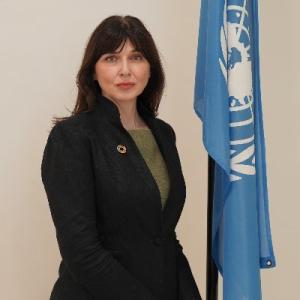Dear,
Rahim Aliyev, Deputy Minister of Health, of Azerbaijan Republic;
Soltan Mammadov, Milli Majlis, Member of Parliament, member of Health Committtee, Haydar Aliyev Foundation;
Rashad Mahmudov, Milli Majlis, Member of Parliament, deputy chair of Health Committee;
Vuqar Qurbanov, TABIB Acting Director, Public Association “Medical Territorial Units Management Association”;
Representatives of community of people living with HIV,
Excellencies and colleagues,
Forty years ago, the Center for Disease Control and Prevention in US, reported on the first five cases of what later became known as AIDS. At that time, none of us could have imagined that AIDS would still be with us, or that it would have taken almost 37 million lives globally.
Today, on World AIDS Day, December 1, we honor the memory of men, women and children lost to AIDS. We also celebrate 37.7 million people worldwide, including 9,900 in Azerbaijan who are living with HIV.
Humanity is threatened by an expanding list of pandemics. AIDS is colliding with COVID-19 to deadly effect, because much of the world remains dangerously under-prepared and under-resourced to confront the pandemics of today and tomorrow.
Over four decades advances in science, and public health investment have driven remarkable success against AIDS. This progress has shown what is possible when countries and communities work together against a deadly contagion.
However, considerable gaps remain.
Our region of Eastern Europe and central Asia is failing to control its HIV epidemic, with new HIV infections and AIDS-related deaths both continuing to rise. The annual number of new HIV infections increased by an estimated 43% from 2010 to 2020, making this the fastest growing HIV epidemic in the world.
Azerbaijan , though has recorded a decline in new HIV infections from less than 500 in 2010, to less than 200 in 2020. Overall, 73% of people living with HIV knew their HIV status, 57% were receiving antiretroviral therapy, and 48% were virally suppressed in 2020.
Diagnosing people living with HIV and linking them to treatment and care are the biggest gaps in both larger region’s treatment efforts, but in Azerbaijan too. There is a substantive gap to be closed in order to reach the 95-95-95 targets by 2025.
The Global Fund has invested more than US$ 138 million since 2002 in Azerbaijan, working alongside the government in achieving significant progress in HIV prevention and treatment.
For the period 2021-2024 the Global Fund has allocated US$ 17.3 million for HIV and Tuberculosis control , which represents US$ 5.7 million of annual investment to support the rehabilitation, rebuilding and development of critical infrastructure and the procurement of qualitative and affordable HIV and tuberculosis drugs and diagnostics, while enhancing national capacities in demand forecasting, supply chain management and appropriate use of medicines.
Azerbaijan is also giving back and leads by example.
During the 6th Global Fund Replenishment meeting in Lyon, France in October 2019, the Government of Azerbaijan has announced the first-time pledge of US$20 million to the Global Fund for the next three years. This demonstrated country’s commitment to the Sustainable Development Goals and the principle of shared responsibility.
Addressing the inequalities that drive the spread of AIDS and other infectious diseases is the theme of this year’s World AIDS Day, 1st December.
We cannot end AIDS, COVID or any pandemic, unless we end these inequalities that present barriers for some.
That’s why, just six months ago, United Nations Member States, including Azerbaijan, agreed to a new approach—to address inequalities, to close gaps in HIV service access by 2025 and to get on track to the global goal of ending AIDS by 2030.
These targets are mirrored in the Political Declaration “Ending Inequalities and Getting on Track to End AIDS by 2030” that was adopted by Member States at the United Nations General Assembly in June this year.
The Declaration focuses on tackling the inequalities by using data to identify where inequalities are and identify concrete strategies to close them; taking seriously the intersections of gender, discrimination, income, and representation and their effect on access to services.
Forty years on, we must take this important moment to reflect, recommit, reenergize, and reengage. After decades of progress, our work is not yet finished.
To complete this journey we must come together as partners at country level and as a global community.
It is time to End inequalities. End AIDS. End pandemics.
Thank You!



